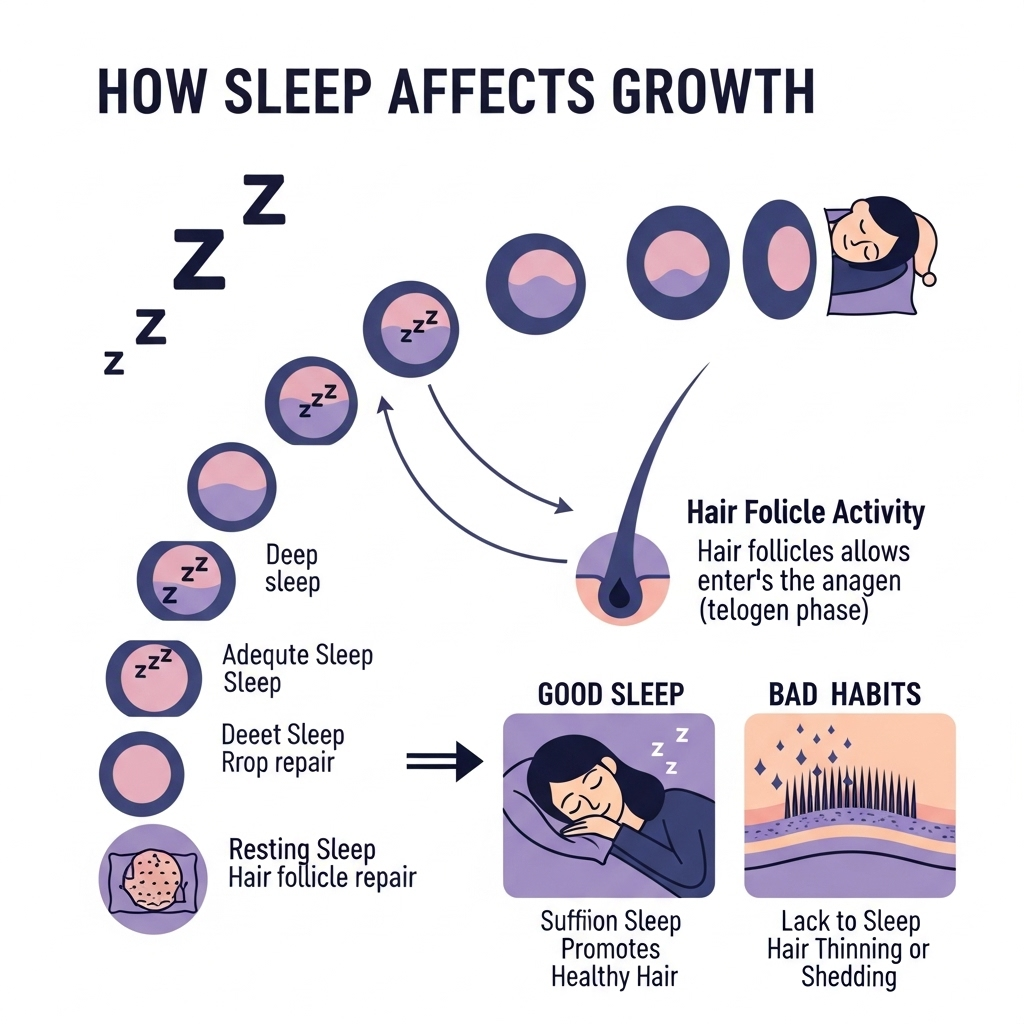When it comes to hair health, most people focus on external factors—shampoos, oils, serums, and treatments. But what if one of the most powerful influences on hair growth is something we do (or don’t do) every night? Quality sleep is not only essential for overall health, but it also plays a surprising and significant role in hair growth and regrowth. In this guide, we’ll explore how sleep affects hair health, the science behind it, and what you can do to improve both your rest and your regrowth.
Understanding the Hair Growth Cycle
To understand how sleep impacts hair, we need to first look at how hair grows. Hair goes through a natural cycle of growth and rest, consisting of three main phases:
- Anagen (Growth phase): Hair actively grows during this period, which can last 2–7 years.
- Catagen (Transition phase): A short phase that signals the end of active growth.
- Telogen (Resting phase): Hair rests and then falls out, making room for new hair.
Your body’s ability to support this cycle depends heavily on your overall health, and this includes the quality of your sleep.
How Sleep Influences Hair Growth
Hormonal Regulation During Sleep
While you sleep, your body enters a state of repair and regeneration. Critical hormones involved in this process—such as melatonin, human growth hormone (HGH), and cortisol—fluctuate throughout the night. These hormones have a direct and indirect impact on hair follicles.
- Melatonin, the hormone responsible for regulating sleep-wake cycles, also possesses antioxidant properties. It helps reduce oxidative stress, which can otherwise damage hair follicles.
- HGH, released during deep sleep, supports tissue growth and cell regeneration, including the cells that power hair growth.
- Cortisol, the stress hormone, should decrease during restful sleep. Elevated cortisol levels, often caused by chronic stress and poor sleep, have been linked to hair thinning and even conditions like telogen effluvium, where hair prematurely enters the shedding phase.
Poor Sleep = Poor Circulation
Your scalp, like the rest of your body, relies on proper blood flow to deliver nutrients and oxygen to hair follicles. Sleep deprivation or interrupted sleep can interfere with healthy circulation, reducing the delivery of essential nutrients that your hair needs to grow strong and healthy.
Inflammation and Immune Response
Consistently poor sleep can increase systemic inflammation. Inflammatory markers in the body can negatively affect the health of your hair follicles, especially if you’re already dealing with an underlying scalp condition like alopecia or psoriasis. When your immune system is out of balance due to lack of sleep, it may contribute to autoimmune-related hair loss.
The Link Between Sleep Disorders and Hair Loss
Research increasingly points to a connection between sleep disorders and hair thinning. Conditions like insomnia, sleep apnea, and restless leg syndrome disrupt the body’s ability to recover during the night. These disruptions lead to hormonal imbalances, elevated stress responses, and poor tissue repair—all of which can impact the hair growth cycle.
One study found that individuals who suffered from chronic insomnia reported a greater prevalence of hair thinning compared to those who regularly slept 7–9 hours. Another observed that sleep apnea patients who received treatment with CPAP machines often experienced improvements not only in energy levels but also in skin and hair health.
Tips for Better Sleep to Support Hair Regrowth
Create a Consistent Sleep Schedule
Your body thrives on routine. Going to bed and waking up at the same time every day helps regulate your circadian rhythm, which in turn supports hormonal balance essential for healthy hair growth.
Reduce Stress Before Bed
High stress levels can contribute to poor sleep and increase the risk of stress-related hair loss. Consider relaxation techniques such as meditation, deep breathing, or reading before bed to calm your mind and improve sleep quality.
Avoid Screens and Blue Light
Exposure to blue light from phones, tablets, and computers before bed can interfere with melatonin production. Try turning off screens at least an hour before sleep and opt for activities that help your body wind down naturally.
Supportive Nutrition and Hydration
Eating a balanced diet rich in hair-friendly nutrients like iron, zinc, biotin, and omega-3s supports both sleep and hair growth. Hydration is also key—your hair needs moisture from the inside out to stay strong and healthy.
Optimize Your Sleep Environment
A dark, quiet, and cool room encourages deeper sleep. Invest in blackout curtains, a white noise machine, or even aromatherapy diffusers with lavender or chamomile to create a sleep-friendly space.
What If You’re Still Losing Hair Despite Good Sleep?
While quality rest is crucial, it’s only one part of the puzzle. Hair loss can also be caused by genetics, medical conditions, hormone imbalances, and nutritional deficiencies. If you’re maintaining a healthy sleep routine but still experiencing hair thinning, it may be time to explore medical-grade hair restoration options.
At ZMD Hair, we offer a range of treatments including Platelet-Rich Plasma (PRP) therapy, non-surgical hair regrowth solutions, and advanced hair transplant techniques. Our holistic approach ensures we evaluate not only your hair but the contributing lifestyle factors—like sleep—that could be impacting your results.
Conclusion: Sleep Is the Unsung Hero of Hair Health
The science is clear: sleep isn’t just good for your brain and body—it’s vital for your hair. If you’ve been focused on serums and supplements but ignoring your sleep patterns, you might be missing a major opportunity for regrowth. Consistent, high-quality rest helps regulate your hormones, reduce stress, boost circulation, and support cellular repair—all of which are necessary for strong, healthy hair.
At ZMD Hair, we understand the deep connection between lifestyle and hair health. Our specialists take the time to assess your full picture—including sleep habits—when crafting a personalized hair restoration plan. Because achieving real, lasting results starts from within.
Struggling with hair thinning and ready to take the next step? Schedule your consultation with ZMD Hair today and discover how our personalized treatment options—combined with smarter sleep habits—can help you grow back your confidence.




